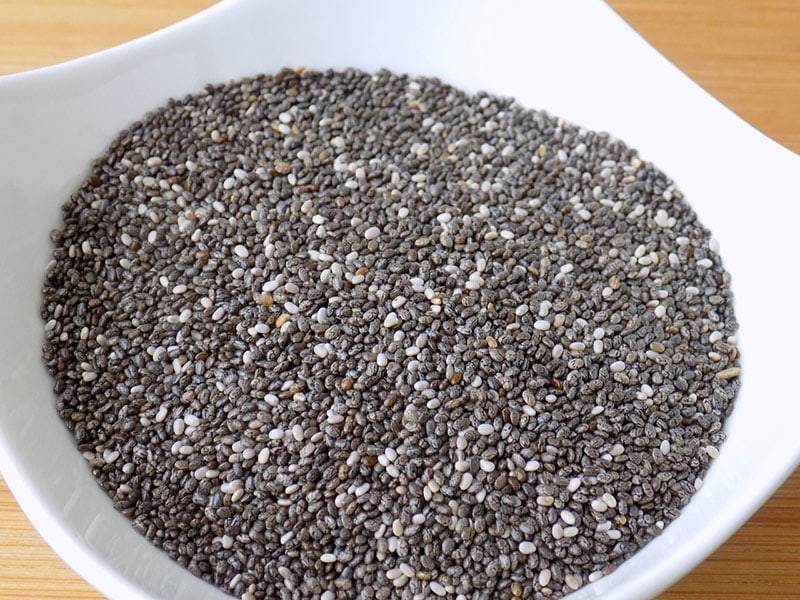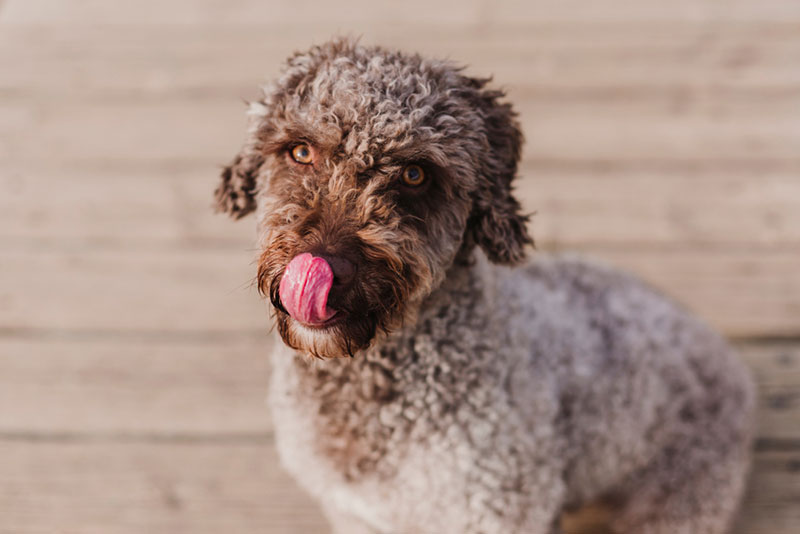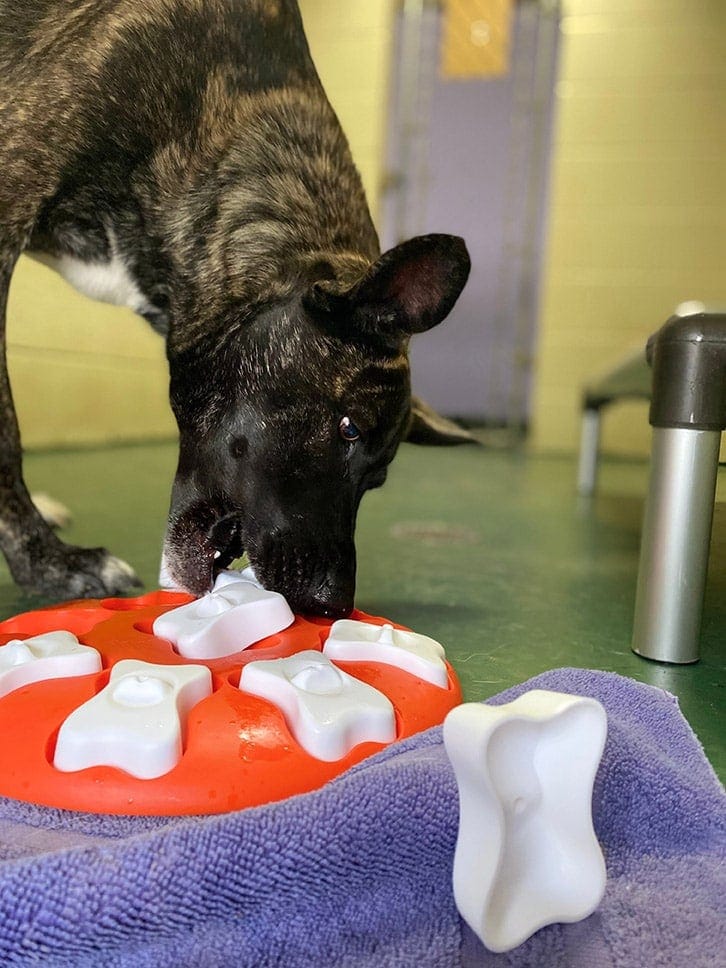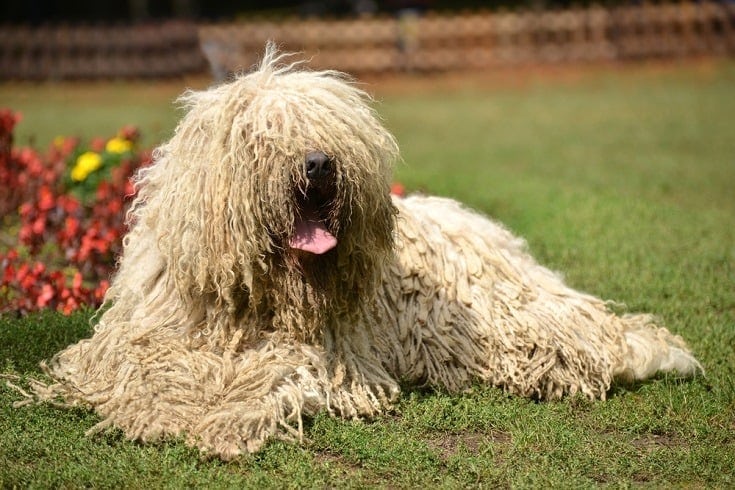Can Dogs Eat Chia Seeds? Vet-Approved Nutrition Facts & Safety Guide
By Beth Crane
Updated on

Chia seeds are a superfood that has gained popularity over the last few years. They are often added as a topper to salads, yogurts, and bread for a healthy nutrient boost; the same is true for some dog foods. Chia seeds are added to many treats and dry dog foods to include healthy fats. Dogs can eat chia seeds since they are non-toxic and provide powerful health benefits.
However, there are some precautions you’ll have to take if you want to feed them to your dog. We’ll take you through these and more in this article and lay out all the benefits a sprinkling of chia seeds can bring your pup!
What Are Chia Seeds?
Chia seeds are the tiny, edible seeds of the Salvia Hispanica plant, hailing from Mexico and Guatemala. These seeds have been nourishing the population for centuries; the chia plant was a crop of great importance to the Aztec people of the area as a foodstuff and medicine! Chia seeds have excellent health benefits for people and their pets. Many foods, treats, and supplements for dogs now include chia seeds, which are safe and nutritious.

Are Chia Seeds Healthy for Dogs?
When given in moderation, chia seeds are beneficial for most dogs. Because they’re so small and have a relatively unnoticeable flavor (even to the canine palate), dogs often do not notice chia seeds when added to food; getting them to eat them is easy! Chia seeds are full of fiber, vitamins, minerals, and omega-3 fatty acids, but the fiber and fatty acids are what set the chia seed apart:
- Fiber: Chia seeds are incredibly high in fiber, with one ounce containing a whopping 10 grams of fiber! Fiber can help your dog stay full longer and keep their gastrointestinal system running smoothly, which can be useful for older dogs or dogs recovering from gastrointestinal upset.
- Omega-3 fatty acids: Chia seeds also contain high amounts of omega-3 fatty acids, such as alpha-linolenic acid (ALA), which is an essential fatty acid for dogs. Omega-3 acids support skin and joint health, promote optimum neuron and eye health, and help decrease inflammation.
Chia Seeds also contain larger amounts of calcium than dairy (pound-for-pound), which can help keep your dog’s bones and teeth strong. Magnesium and phosphorus are present in smaller amounts in chia seeds, which are both important in energy production, muscle and nerve function, and bone health.
How Many Chia Seeds Can I Give My Dog?
While it’s hard to find the exact amounts or recommended daily allowances of chia seeds for dogs, the best way to decide how many chia seeds to give your dog is to ask your veterinarian for advice. You should contact your vet before you give your dog any new food (including chia seeds), and they can decide on the appropriate amounts to feed.
It’s wise to start your dog off on a small number of chia seeds to begin with, so you can gauge your pup’s reaction before going ahead. Overdoing it on chia seeds can cause problems, and a small amount can pack a punch, so 2 tablespoons (1 ounce) is the most many people give to their dogs.

How Should I Prepare Chia Seeds for My Dog?
Chia seeds should be prepared before giving them to your pup. While chia seeds are safe and non-toxic to be given as-is, risks are involved. It’s best to prepare your chia seeds by soaking them in water for 5 to 10 minutes before feeding them to your dog to prevent choking since they can absorb lots of water.
Chia seeds are most commonly given to dogs as a topper sprinkled over their normal dog food. However, chia seeds can be given in dog treats, on their own, or even in a plain chia pudding! As long as no toxic foods are added to the chia seeds, they’re okay to serve to your dog.
Are Chia Seeds Dangerous for Dogs?
Chia seeds aren’t dangerous for dogs since they’re non-toxic, but there are some risks involved that you should know. Chia seeds are renowned for their amazing ability to hold water, absorbing up to 10 times their weight in liquid when placed in water! This causes the seeds to expand, eventually ending up in a gel. Dogs eating dry chia seeds could unknowingly get them stuck in their throats. The seeds could absorb moisture and expand, becoming a choking hazard for your pup.
You should avoid giving your dog large portions of chia seeds, as their high fat and fiber can cause gastrointestinal distress, including diarrhea, bloating, and gas. The high amount of fat (good fat, but fat all the same) in chia seeds can also make them inappropriate for obese dogs or dogs with conditions such as pancreatitis.
Lastly, a rare but deadly toxin can be released by fungi and molds that grow on chia seeds. Aflatoxin is a mycotoxin produced by Aspergillus, which is incredibly dangerous for dogs to ingest as it damages the liver. Dogs poisoned by aflatoxin can suddenly die, but signs of poisoning can include vomiting, diarrhea, anorexia, depression, icterus (jaundice), and death.
Aflatoxin is usually found on other types of seeds or grains, but it has been found on chia seeds; always ensure any chia seeds you give your dog are fresh and haven’t been stored in a dark or damp place.
Final Thoughts
Chia seeds are just as much of a superfood for our dogs as they are for us. They’re small and inoffensive, but they provide a huge amount of calcium and fiber alongside a healthy dose of essential fatty acids to keep your dog looking and feeling good. There are some safety precautions to consider when preparing and feeding chia seeds to your dog, but checking these with your veterinarian (and checking the dosage) should mean they reap all the benefits of the tiny but mighty seed.
You Might Also Be Interested In:
Featured Image Credit: ValeriaLu, Pixabay













